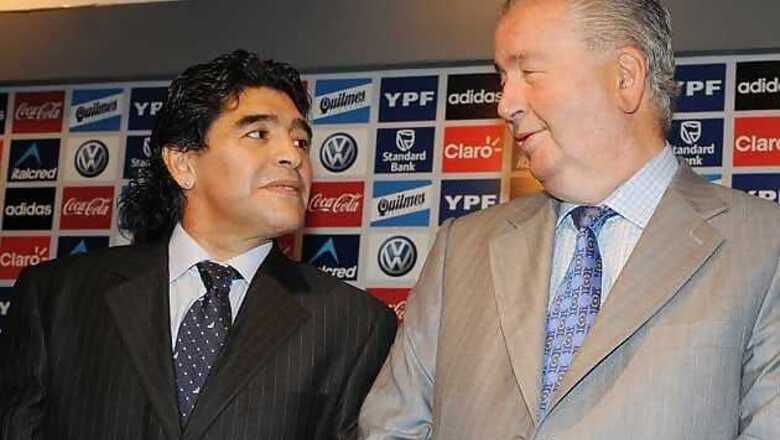
views
Buenos Aires: Julio Grondona, the longtime head of the Argentine Football Association, has died. He was 82.
The announcement was made on Wednesday by the South American football confederation, CONMEBOL.
Grondona, a powerful ally of FIFA president Sepp Blatter, had been hospitalized earlier on Wednesday. Local media reported that he died hours later of heart problems.
Grondona had been the AFA's president since 1979. He was also a FIFA senior vice president and head of FIFA's finance committee, and had announced that he would step down from his posts in 2015.
Blatter responded to the death almost immediately with a tweet: "Very sad for the loss of a great friend. Julio Grondona has left us at 82. Rest in peace."
Grondona attended the World Cup final three weeks ago when Argentina lost 1-0 to Germany at the Maracana stadium in Rio de Janeiro. He mingled in the stands with other top football officials before the match, including UEFA president and FIFA vice president Michel Platini.
"Julio Grondona was a very pleasant man who would happily spend many hours talking about football, and I was fortunate to engage in these discussions with him," Platini said in a statement. "He was a true football lover for many, many years, and on behalf of the European football family, I would like to extend my deepest condolences to his family, and to Argentine football."
Argentina star Lionel Messi was among those to send condolences after the announcement.
"It's a very sad day for football, for all of Argentina and for me," the Barcelona forward wrote on his Facebook account. "Our president, Julio Grondona, you have left us. I want to send my sincere condolences and a large hug to all his family members and friends."
Cesar Menotti, who was Argentina's coach when it won the World Cup in 1978, called Grondona "a football man who knew the game as a leader."
Grondona rose from modest roots. He helped found Argentine club Arsenal de Sardani and was a director from 1957 until he left in 1976 to take over the presidency of club Independiente. He stayed there until taking over at AFA three years later.
With Grondona in charge, Argentina won the World Cup in 1986 and lost the finals in 1990 and 2014. Grondona became one of world football's most powerful figures, despite speaking almost no English.
"I speak only Spanish," he said in an interview. "But I have an advantage over the rest of the polyglots. I speak the language of football very well."
Grondona worked with few assistants, often answering the phone in his office himself. He kept his books the old-fashioned way, putting entries in a ledger, shunning computers.
"Technology - I know nothing and don't have any interest," he said a few years ago. "It's too late for me."
He was never far from controversy.
Critics blamed him for the endemic fan violence in Argentine football, where every club match faces the threat of violence by hooligan groups. Grondona said the problem simply reflected the growing violence on the streets of the country.
He was also heavily criticized by former national coach and retired star Diego Maradona, who blamed Grondona for many of the festering problems in the national game.
Grondona hired Maradona as the national team coach and then dismissed him after Argentina lost in the quarterfinals of the 2010 World Cup. During the 2014 tournament, Maradona responded to being called a "bad luck charm" by Grondona by showing him the middle finger on live TV.
A son, Humberto, was questioned by FIFA during the World Cup in Brazil, amid media reports that he had sold some tickets for profit. FIFA said later that he "most probably" gave tickets to a friend and did not sell them.
He had various health problems in recent years and was badly affected by the death of his wife Nelida in 2012.
As a mark of respect, this weekend's Argentine football matches have been postponed, along with a news conference scheduled on Wednesday at which national team coach Alejandro Sabella had been expected to announce his departure.




















Comments
0 comment